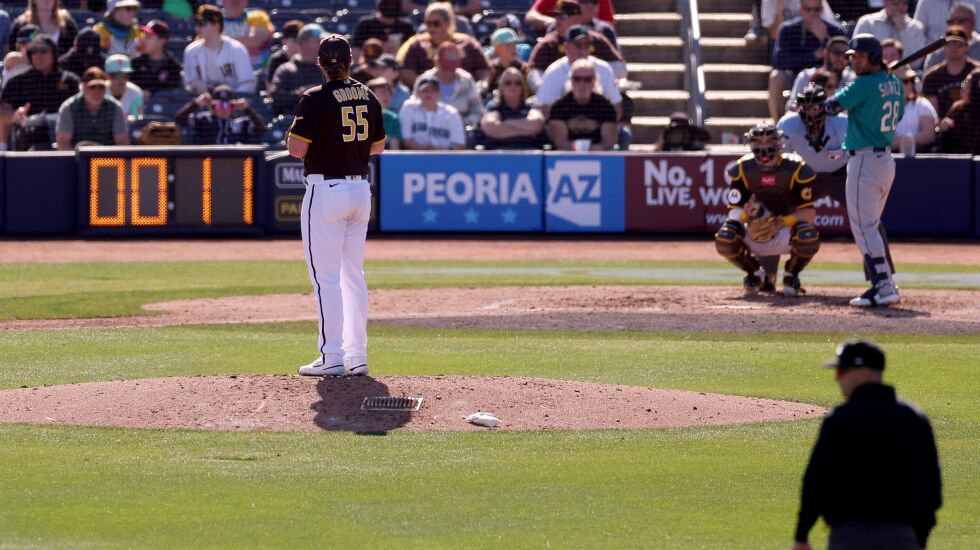
You wouldn’t think there’s anything romantic about Major League Baseball’s new pitch clock. Fifteen seconds and it’s over. Twenty seconds now and then.
And, yet, I believe I’m falling in love with baseball again because of that wonderful innovation. Time is flying, blessedly.
Spring training games have been a revelation. Pitchers throw a pitch, get the ball back from the catcher and almost immediately get ready to do it again. Hitters keep one foot in the box in anticipation of a ball coming their way very soon. All of it in the name of beating the clock.
All of it in the name of saving baseball.
Many of us spent the past several decades bemoaning how painfully slow the game had become. A pitcher would adjust his cap, pick up the rosin bag, gaze at the sky, send out for Chinese and maybe, possibly think about throwing a pitch, but only after shaking off the catcher three times. The hitter, in turn, would tighten his batting gloves after each pitch as if the survival of the planet depended on it, take a cleansing breath or two, step into the box and then raise his hand for time because the pitcher was still trying to decide between the kung pao chicken and the sweet and sour pork.
We put up with it because we’d been conditioned to eat what was in front of us. We weren’t enamored with the taste, and it took forever for the food to arrive. But we needed the nutrition that baseball gives us.
You haven’t experienced Dante’s nine innings of hell until you’ve watched a season of three-hour-plus games, of managers changing pitchers again and again, of umpire reviews and of the aforementioned pitcher-hitter slow dance.
Finally, faced with the reality of plummeting TV ratings and young fans turning to other sports for entertainment, baseball woke from its slumber. The maddening question is what took the clock so long to get here. The maddening answer is that the game has been run by people devoid of working reflexes. Change too often looked like a tortoise at top speed.
But now we have the prospect of two-hour games. If spring training is any indication, we’ll have constant action. Critics will point out that the pitch clock won’t greatly increase the number of balls in play, but that’s missing the point. The game will be faster, meaning the hits will come faster, too. And then there’s this breaking news: Baseball is about a lot more than hitting. If you appreciate pitching, imagine how much more engrossing it will be when a pitcher has to work quicker.
Under the new rules, shepherded into being by former Cubs president Theo Epstein, pitchers have 15 seconds between pitches when the bases are empty and 20 seconds between pitches when a runner is on base. If the clock expires before a pitch is thrown, the pitcher is penalized an automatic ball. The specter of a pitcher absolutely losing his mind is a delicious possibility.
Other rule changes include the banning of the shift, that crime against baseball, and the enlarging of bases. Bigger bags should mean more stealing, which should bring more excitement to a game that too often has made runners look like buses stopping at every corner.
In the past, you could take your eyes off a game on television. You could mindlessly look at your phone between pitches and feel confident you wouldn’t miss much. Now let the texter beware, IMHO.
All of this is a long way of saying, Hallelujah.
The Cubs won the 2016 World Series in part because Epstein was able to take advantage of the quirks of the game that he helped get rid of seven years later as a Major League Baseball consultant.
“The game has evolved a lot over the last two or three decades, and some of those changes have been driven by optimizations that were led by front offices and people like me pushing them,” he said. “And while it might have helped you win some more games, it didn’t necessarily change the game for the better for the fans in terms of the way the game is played on the field aesthetically.”
Nostalgic baseball fans loved the leisurely pace of the game pre-pitch clock. They loved being able to take in the sights and have a conversation with the people next to them. At home, they’d gasp in horror whenever a TV camera caught young people staring at their smartphones while a game was going on. What’s wrong with this generation?! But the incriminating part wasn’t the kids looking at phones. It was a game that couldn’t keep their attention.
Now there’s a chance of attracting the younger crowd. And oldsters like me.







